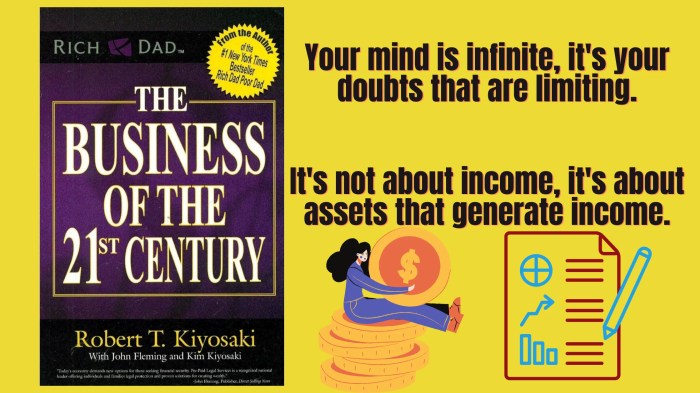In the business landscape of the 21st century, the “Business of the 21st Century Summary” presents a comprehensive analysis of the transformative shifts that have reshaped the global business environment. This summary explores the fundamental changes in business models, technologies, and customer expectations that have redefined the way businesses operate and succeed.
From the rise of new industries to the decline of traditional ones, the factors driving these changes are examined in depth. Key technologies such as cloud computing, artificial intelligence, blockchain, and mobile devices are identified and their revolutionary impact on business operations is analyzed.
The importance of data-driven decision-making and the challenges of collecting, analyzing, and interpreting vast amounts of data are also discussed.
1. The Evolving Landscape of 21st Century Business: Business Of The 21st Century Summary
The 21st century has witnessed a fundamental shift in the business landscape, driven by advancements in technology, changing customer expectations, and the emergence of new industries. Traditional business models have been disrupted, while new opportunities have arisen, reshaping the way businesses operate and compete.
Key factors contributing to this evolution include the rise of the digital economy, globalization, and increased consumer empowerment. Businesses are increasingly leveraging technology to enhance efficiency, improve customer experiences, and create innovative products and services.
The decline of traditional industries, such as manufacturing and agriculture, has been accompanied by the emergence of new industries, such as technology, healthcare, and renewable energy. These shifts have created both challenges and opportunities for businesses, requiring them to adapt to changing market dynamics and customer preferences.
2. Key Technologies Shaping the Business of the 21st Century
Cloud Computing
Cloud computing has revolutionized business operations by providing access to computing resources and applications over the internet. It offers scalability, flexibility, and cost-effectiveness, allowing businesses to focus on core competencies and reduce IT infrastructure costs.
- Examples: Amazon Web Services, Microsoft Azure, Google Cloud Platform
- Benefits: Reduced IT costs, improved scalability, enhanced collaboration
Artificial Intelligence
Artificial intelligence (AI) is transforming business processes by automating tasks, improving decision-making, and enhancing customer experiences. AI algorithms can analyze vast amounts of data, identify patterns, and make predictions.
- Examples: Machine learning, natural language processing, computer vision
- Benefits: Improved efficiency, enhanced customer service, personalized recommendations
Blockchain
Blockchain is a distributed ledger technology that provides a secure and transparent way to record transactions. It is used in various industries, including finance, supply chain management, and healthcare.
- Examples: Bitcoin, Ethereum, Hyperledger Fabric
- Benefits: Increased security, improved transparency, reduced costs
Mobile Devices, Business of the 21st century summary
The widespread adoption of mobile devices has significantly impacted business operations. Mobile devices allow employees to access information and applications anytime, anywhere, enhancing productivity and collaboration.
- Examples: Smartphones, tablets, wearable devices
- Benefits: Increased mobility, improved communication, enhanced customer engagement
3. Data-Driven Decision-Making in the 21st Century

In the 21st century, data has become an invaluable asset for businesses. The ability to collect, analyze, and interpret vast amounts of data is essential for informed decision-making.
Data analytics tools, machine learning algorithms, and AI techniques enable businesses to extract insights from data, identify trends, and make predictions. This data-driven approach helps businesses optimize operations, improve customer experiences, and gain a competitive advantage.
Challenges of Data-Driven Decision-Making
- Data quality and accuracy
- Data security and privacy concerns
- Ethical implications of data collection and use
4. Sustainability and Social Responsibility in the 21st Century Business

In the 21st century, businesses are increasingly recognizing the importance of sustainability and social responsibility. Consumers, investors, and regulators expect businesses to operate in a responsible manner that minimizes environmental impact and promotes social good.
Sustainable business practices include reducing carbon emissions, conserving resources, and adopting ethical sourcing practices. Socially responsible businesses prioritize employee well-being, diversity and inclusion, and community engagement.
- Benefits of Sustainability and Social Responsibility:
- Enhanced brand reputation
- Increased customer loyalty
- Improved employee morale
5. The Future of Business in the 21st Century

The business landscape is constantly evolving, and the future holds both opportunities and challenges. Emerging technologies, changing demographics, and global economic shifts will continue to shape the way businesses operate.
Potential Future Trends
- Increased automation and AI adoption
- Growing importance of sustainability and social responsibility
- Shift towards a circular economy
- Increased globalization and interconnectedness
Businesses that embrace these trends and adapt to the changing environment will be well-positioned to succeed in the future.
Clarifying Questions
What are the key drivers of change in the business landscape of the 21st century?
The key drivers of change include fundamental shifts in business models, the emergence of new technologies, and evolving customer expectations.
How are key technologies shaping the business of the 21st century?
Key technologies such as cloud computing, artificial intelligence, blockchain, and mobile devices are revolutionizing business operations, improving efficiency, enhancing customer experiences, and creating new opportunities.
Why is data-driven decision-making important in the 21st century?
Data-driven decision-making is essential in the 21st century as it enables businesses to make informed decisions based on data analysis, machine learning, and artificial intelligence.
How are sustainability and social responsibility impacting businesses in the 21st century?
Sustainability and social responsibility are becoming increasingly important, with businesses recognizing the benefits of adopting sustainable and ethical practices, including enhanced brand reputation, customer loyalty, and reduced operating costs.
What are some potential future trends that could shape the business landscape in the coming years?
Potential future trends include the continued advancement of artificial intelligence, the rise of automation, the growth of e-commerce, and the increasing importance of sustainability.